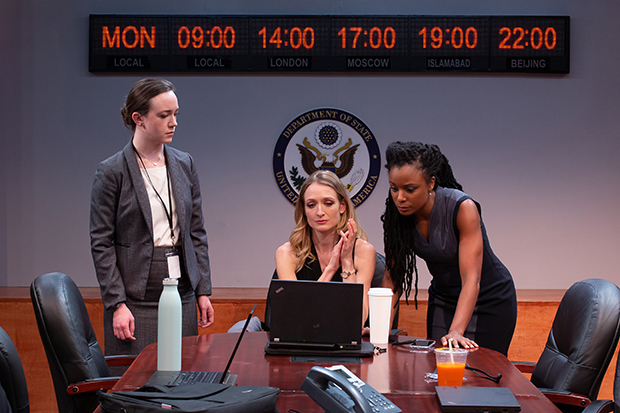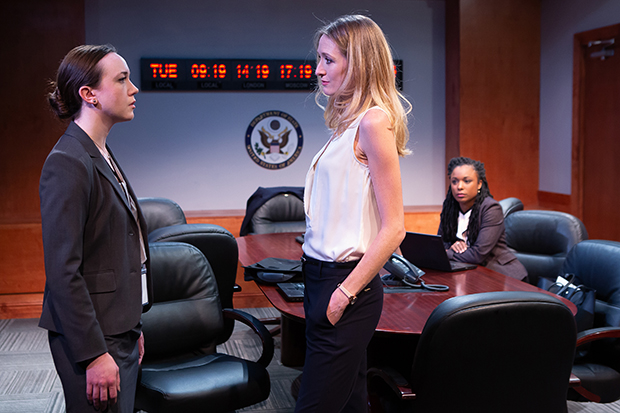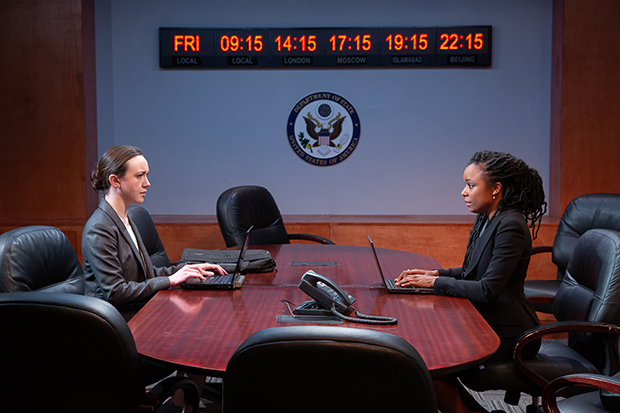Intelligence and the Art of Diplomacy
Three women in a room try to upend the State Department’s playbook in Helen Banner’s new drama.

(© Hunter Canning)
Sarah MacIntyre (Rachel Pickup) is an unconventional diplomat appointed by an unconventional president to resolve an intractable conflict in a far-flung locale — and at first it appears as though she's been successful. What's her secret? She hopes to impart her maverick wisdom on two younger diplomats, the cautious Paige (Amelia Pedlow) and more adventurous Lee (Kaliswa Brewster). But as events on the ground shift, they wonder if they should even be seen in the same room as Sarah. That's the basic premise of Intelligence, Helen Banner's engrossing yet preposterous new drama, now making its world premiere as part of Next Door @ NYTW.
The entire play takes place in a windowless conference room at the State Department. Fresh off her historic peace negotiations with a militant splinter group, Sarah intends to occupy the room for two weeks with Paige and Lee, her handpicked scribes for her Guidelines for the Resolution of Conflict in Intractable Global Situations. They write based on role-play exercises in which Sarah re-creates her encounters with the group's leader, played by either Paige or Lee (how they know what he said in these situations is never explained). "Hi. I'm Sarah MacIntyre," she says to the terrorist, a seductive tilt in her shoulders, "I want to talk with you." These short scenes depict a range of behavior, from intimate caresses to blood-curdling screams, causing this high-level diplomatic debriefing to resemble an improv class at the Actors Studio.

(© Hunter Canning)
That improvisational vibe is reinforced by Banner's scrupulous avoidance of specific geopolitical details: Beyond the vaguely Middle Eastern music of a recruitment video (sound designer Sinan Refik Zafar mercifully disobeys the script here), we're never told what part of the world we're dealing with, or the specific objectives of the terrorist group. When Sarah pushes Paige to adopt an accent in her role-playing, Paige demurs, "I know the accents are very specific in that region." The anxiety in Pedlow's eyes as she utters these lines feels completely genuine.
In their ultra-committed portrayals of these three ultra-serious characters, the three actors regularly slip across the mountainous border between serious drama and camp, like Taliban insurgents creeping down the Khyber Pass. This is particularly true of Pickup, who endows MacIntyre with the witchy intensity of a cult leader, incanting her lines with hushed electricity. Costume designer Sophia Choi outfits her in Ann Coulter Loft, with a series of low-cut sleeveless tops that contrast with Paige's please-don't-notice-me gray suit. We watch as this sexually confident fortysomething cajoles and interrogates the skittish millennials. It's consistently entertaining, even when it strains credulity.

(© Hunter Canning)
The most dramatically compelling (and, not coincidentally, realistic) aspect of Intelligence is the way Banner depicts the contagion of office politics, as outside whispers infiltrate Sarah's diplomatic laboratory. The information Paige and Lee gather in their off-hours strain their encounters with Sarah, while Sarah's cynical State Department rival, Courtney Reingeld, feels extraordinarily present for an offstage character.
Director Jess Chayes tells this story with the unnerving sound of heels clicking in the hallway and scratches at the door. It's enough to make Carolyn Mraz's conference room set (complete with leatherette swivel chairs and sterile carpeting) feel like a sanctuary. Jeanette Oi-Suk Yew subtly replaces the fluorescent office lighting with an amber glow during the more intense role-plays, transporting us away from Washington. Briefly, this story of invention imperiled by professional resentment seems to justify the overwrought performances and highly contrived circumstances.

(© Hunter Canning)
Unfortunately, Banner backs off this exciting chase for easier prey, as Intelligence nestles into an unsubtle critique of the devaluation of diplomacy in the Trump era. It makes the last few scenes feel especially inert, as Sarah reveals herself to be the recognition-hungry charlatan we all suspected she was from the very beginning. Through her, Banner attacks the cherished American myth of the maverick who breaks all the rules and saves the day. But when that story plays out every hour on the news, such cautionary tales come off as superfluous onstage.









